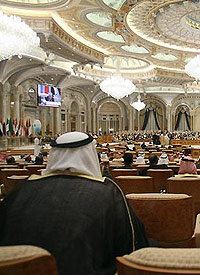We, the Heads of State and Government of Member Countries of the Organization of the Petroleum Exporting Countries (OPEC), continuing in the spirit of our First and Second Summits held in Algiers and Caracas in 1975 and 2000, respectively, have accepted the invitation extended by the Custodian of the Two Holy Mosques, King Abdullah Bin Abdulaziz, to meet for our Third Summit in
Reaffirming the inalienable and permanent sovereign rights of our Countries over their natural resources;
Cognizant of our Countries’ commitments to conserve, efficiently manage and prolong the exploitation of their exhaustible petroleum resources, in order to promote the sustainable development and the welfare of our future generations;
Recognizing our obligation to develop our Countries and raise the living standards of our peoples;
And emphasizing the role of our Organization and its contribution to global energy market stability and economic prosperity;
Have agreed to the following principles to guide our Organization and Member Countries’ economic, energy and environmental endeavors, within the following three themes:
• Stability of global energy markets
• Energy for sustainable development
• Energy and environment
Stability of Global Energy Markets
We recognize the importance of reliable, affordable and competitive energy supplies in ensuring global prosperity and the role of petroleum in world energy consumption. We also recognize the leading role of our Organization in meeting growing global
energy needs, including those of developing economies, and our Organization’s mission of securing the efficient, economic and regular supply of petroleum to consumers, with a steady and reasonable income to the petroleum resource-owning
producers and a fair return on capital to those investing in the petroleum industry.
Globalization has expanded international trade and accelerated economic growth. It has also improved communications, interconnected financial markets, advanced technology and increased mobility. As a result, the world’s energy trade has
expanded and is projected to continue to be driven by global economic and energy demand growth. While globalization provides opportunities, it poses many challenges, such as income inequality, recurring market volatility and underlying uncertainties.
The central role that petroleum plays in the economies of our Countries, as well as the world, makes petroleum market stability essential, not only for resource conservation, but also to our economic and social development. Moreover, the role of energy, especially petroleum, in the economies of the consuming countries makes energy security essential for their sustained economic growth. While we endeavor to diversify our economies and improve the living standards of our peoples, we
recognize that, with globalization, the economies of the world, as well as markets, including energy markets, are integrated and interdependent.
Our Organization is well-positioned to continue to meet a substantial share of the global petroleum need, and, while acknowledging the challenges of globalization and changing world energy market dynamics, we resolve to:
1. Reaffirm our commitment to the principles and objectives, as stated in the Organization’s Statute,
2. Continue providing adequate, timely, efficient, economic and reliable petroleum supplies to world markets.
3. Work with all parties to achieve balanced energy markets and stable and competitive petroleum prices.
4. Emphasize the importance of global peace in enhancing energy investment and market stability and predictability.
5. Undertake the necessary investments to increase upstream and downstream capacities in our Member Countries, and, at the same time, urge consuming nations to provide the environment conducive to petroleum investments
in their countries.
6. Underscore the interrelationships between global security of petroleum supply and the security and predictability of demand.
7. Urge all parties to find ways and means to enhance the efficiency of financial petroleum markets with the aim of reducing short term price volatility that is harmful to producers and consumers.
8. Promote efficiency and sustainability of the production and consumption of petroleum resources, while recognizing the roles of technology and innovation.
9. Continue the process of coordination and consultation with other petroleum-exporting countries, in the interests of all petroleum producers.
10. Strengthen and broaden the dialogue between energy producers and consumers through the International Energy Forum and other international and regional fora, for the benefit of all, and note successful dialogues between OPEC,
the European Union, the People’s Republic of
11. Reiterate that measures or legislation undermining the spirit of producer-consumer cooperation would jeopardize market stability and energy security.
12. Encourage cooperation and exchanges in the fields of technology and human resource development, among petroleum industries in OPEC Member Countries and with other stakeholders, to promote efficiency, innovation, governance and
international best practices.
13. Urge consuming governments to adopt transparent, non-discriminatory and predictable trade, fiscal, environmental and energy policies and promote free access to markets and financial resources.
14. Work with other governments, international organizations and the international business community to facilitate investment in, and the transfer of technology to, our Member Countries, in order to diversify our economies and achieve social progress and sustainable development.


Your Comment